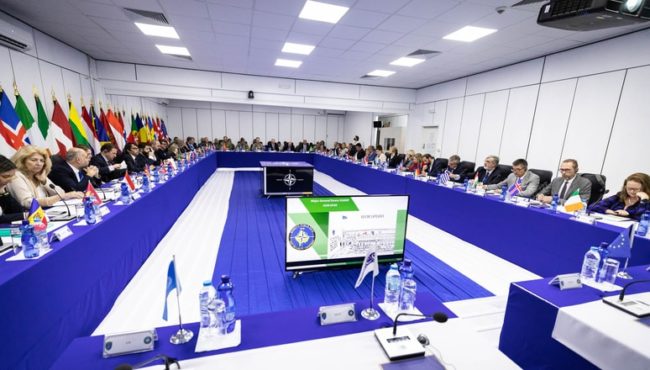NATO reiterates commitment to Western Balkans security

NATO Deputy Secretary General Mircea Geoană and the Ambassadors of Allies and of KFOR troop-contributing Partners visit KFOR, the NATO-led mission in Kosovo
Today (07 July 2022), the NATO Deputy Secretary General, Ambassador Mircea Geoană, and the North Atlantic Council paid a visit to the NATO-led KFOR mission and the NATO Advisory and Liaison Team in Kosovo.
The Ambassadors of the 30 NATO Allies and of the KFOR troop contributing partners met with the KFOR Commander, Major General Ferenc Kajári, and the Director of the NATO Advisory and Liaison Team in Kosovo, Brigadier General Joachim Hoppe. They also exchanged views with the Heads of Mission of the European Union, the European Union Rule of Law Mission, the Organization for Security and Cooperation in Europe, and the United Nations Interim Administration Mission in Kosovo. During the visit, the NATO Deputy Secretary General met with Ms. Vjosa Osmani and Mr. Goran Rakić in Pristina for bilateral discussions.
NATO Deputy Secretary General Geoană recalled that the new Strategic Concept adopted in Madrid last week reaffirms the strategic importance of the Western Balkans region for the Alliance. He stressed that NATO has been committed to peace and stability in the Western Balkans region for decades. “Our KFOR mission is the most tangible demonstration of this commitment,“ he said, noting that under its mandate from the United Nations Security Council Resolution 1244 of 1999, KFOR provides a safe and secure environment and guarantees freedom of movement for the benefit of all communities in Kosovo. “KFOR continues to carry out its mission, by working in close cooperation with a range of actors, including the United Nations, the European Union Rule of Law Mission, the Security Organizations in Kosovo, and the Serbian Armed Forces,” he emphasised.
Mr. Geoana stressed that NATO fully supports the normalisation process between Belgrade and Pristina, as the EU-facilitated Belgrade-Pristina dialogue is the only platform to find a solution that respects the rights of all communities and can lead to a lasting peace. He added that Russia’s brutal invasion of Ukraine has radically changed the European security architecture, and NATO remains strongly committed to a safe and secure environment and to broader stability in the Western Balkans.
















